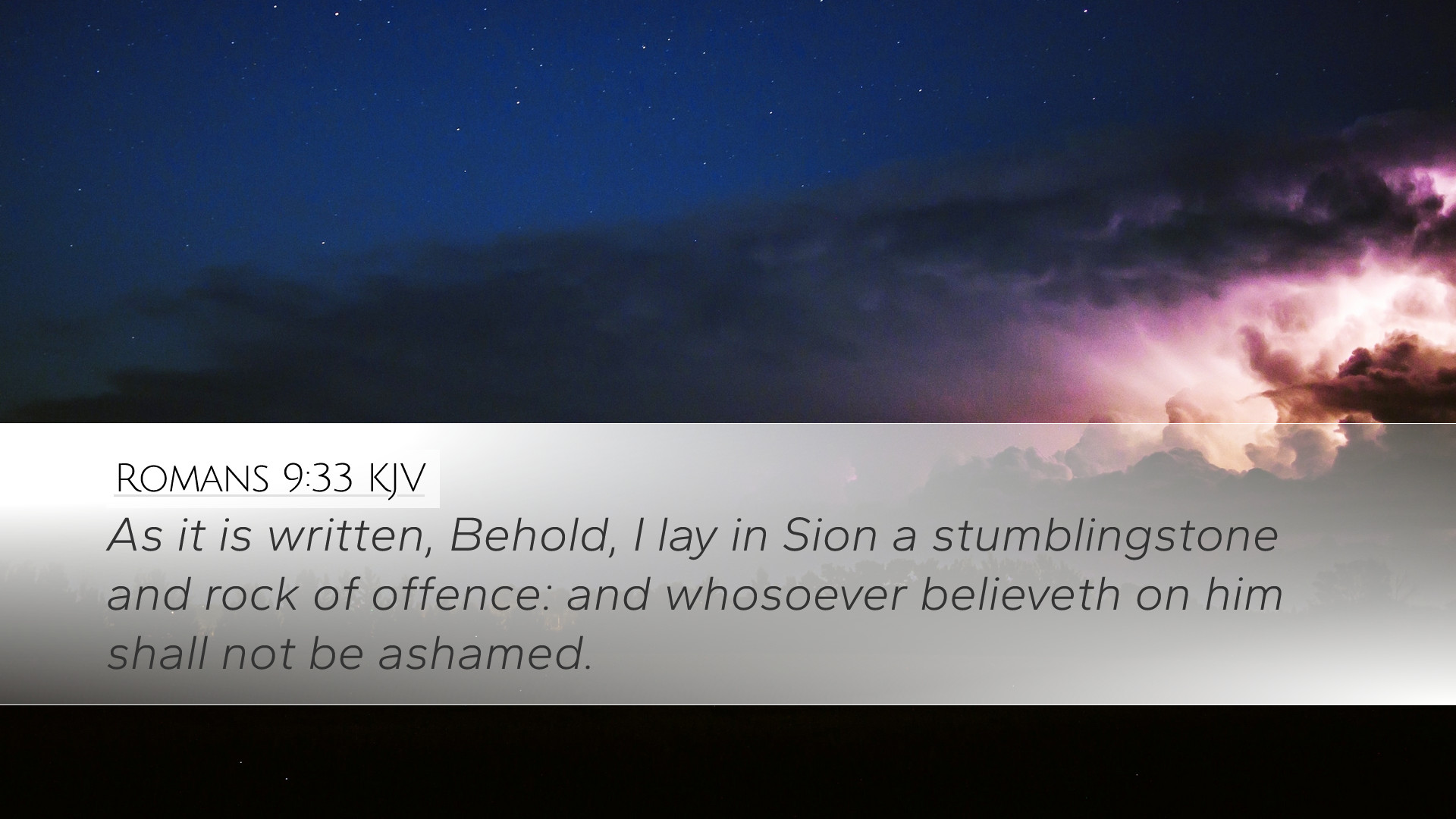Commentary on Romans 9:33
Romans 9:33 states: "As it is written, Behold, I lay in Sion a stumblingstone and rock of offence: and whosoever believeth on him shall not be ashamed." This verse encapsulates profound theological truths about faith, belief, and the nature of Christ as both a foundation and a point of contention.
Exegesis of the Text
In this verse, the Apostle Paul quotes from Isaiah 28:16 and Isaiah 8:14 to illustrate a critical point regarding the Jewish people's relationship to the gospel. Paul emphasizes that while Christ is the cornerstone of faith, he also becomes a stumbling stone for those who do not accept him.
Concept of the Stumbling Stone
Paul’s reference to Christ as a stumbling stone signifies that many would falter in their faith due to their misconceptions of what the Messiah should be. Matthew Henry explains that the Jews expected a political savior, which blinded them to the spiritual redemption that Christ offered. Their expectations resulted in unbelief, making Christ a rock of offense rather than the foundation for faith.
Faith and Belief
The latter part of the verse, "whosoever believeth on him shall not be ashamed," is a declaration of the promise of faith. Albert Barnes comments that this phrase reflects the assurance believers have in Christ; they will not face disgrace for their faith. This assurance serves as a contrast to the shame and confusion of those who reject Him.
Theological Implications
- God's Sovereignty: The choice of Christ as the cornerstone and stumbling stone exemplifies God’s sovereignty in salvation. Adam Clarke emphasizes that this divine choice highlights God’s authority to determine the means of salvation and the reactions it elicits from humanity.
- Response to Jesus: The verse suggests a dichotomy in responses to Jesus. Matthew Henry notes that while some will accept Him and find salvation, others will reject Him, which leads to their downfall.
- Universal Call to Faith: The phrase "whosoever believeth" underscores that salvation through faith in Christ is available to all, not limited to a specific group. This promotes a radical inclusivity in the message of the Gospel.
Historical Context
Understanding the historical backdrop of Romans enhances comprehension of this passage. The early church was comprised of both Jewish and Gentile believers, and the relational dynamics between these groups were fraught with tension. Paul’s assertion about Jesus illustrates a broader theme within Romans: the impartiality of God in dealing with humanity’s sin and the offer of salvation.
Jewish Expectations versus the Gospel
The historical expectation of a dominant political leader among Jews contrasted sharply with Christ’s humble ministry. Paul’s reference to a stumbling stone echoes the reality that Jesus’ terms for discipleship often clashed with prevailing societal ideals. Albert Barnes articulates that many stumbled due to the very grace that was meant to elevate them; they could not comprehend grace apart from the law and ritual.
Application for Faith Communities
- Encouragement for Believers: Pastors and faith leaders can draw from this text the importance of emphasizing faith in Christ as the means of assurance and hope. This assurance is vital in encouraging congregants to trust in God’s promises.
- Addressing Doubts: Leaders ought to acknowledge that doubt and struggle are real experiences for believers. The text invites discussions on how faith can coexist with doubt, directing believers to the steadfastness of Christ.
- Cross-Cultural Evangelism: As there was tension between Jewish and Gentile believers, contemporary ministries must navigate cultural differences carefully, advocating for unity through Christ.
Conclusion
In examining Romans 9:33, we see not only a profound reflection on the challenge of belief but also a core affirmation of God’s faithfulness to those who believe. The theological implications of Christ as both a cornerstone and stumbling stone demand careful reflection, prompting believers to examine their own faith responses in light of God’s redemptive plan.
This verse functions as a reminder of the grace extended to all and the call to steadfast faith amidst life’s difficulties, thus serving as a source of hope and strength for pastors, students, and theologians alike.


